“Let us reflect on three aspects: discernment, formation and charity”
Audience of the Pope with the participants in the General Chapters
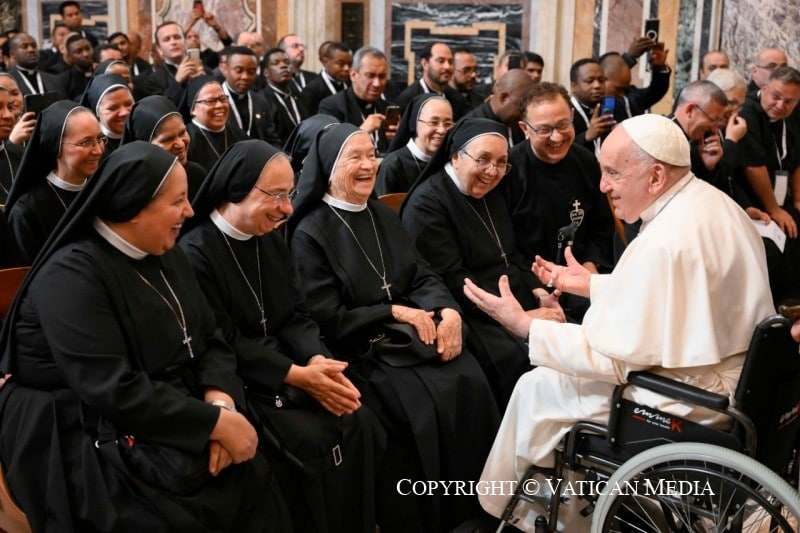
This morning, in the Vatican Apostolic Palace, the Pope received in audience the participants of the general chapters of:
- Dominican Missionary Sisters of St. Sixtus,
- Sisters of the Company of the Sacred Heart of Jesus,
- Sisters of the Presentation of the Most Holy Mary in the Temple
- Society of Divine Vocations (Vocationist Fathers)
In his speech, the Pope advised them not to choose people in their assemblies based on worldly criteria.
***
We publish below the speech that the Holy Father gave to those present during the audience:
Four Chapters! Four Chapters together… we can see that the Prefect knows how to save time by putting them together! This is the time for Chapters…
I offer a warm greeting to the men and women Superiors and to all present. I am pleased to meet you: Dominican Missionary Sisters of Saint Sixtus, Sisters of the Society of the Sacred Heart of Jesus – who was your founder? Maddalena Sofia Barat: a great woman! – Sisters of the Presentation of Mary Most Holy in the Temple and the Society of Divine Vocations (Vocationist Fathers).
During a Chapter, you always have the grace and the responsibility of experiencing a significant moment not only for the life of your Institutes, but also for the whole Church. Chapters are a time for listening to the Holy Spirit in order to enable the charisms granted to your Founders and Foundresses to continue to flourish. So let us pause for a moment to reflect together on three existential and apostolic aspects that you all have in common: discernment, formation and charity.
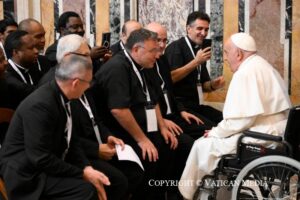
First, discernment. While this is the “proper matter” of the charism of the Vocationist Fathers, obviously, in a broader sense it concerns every religious Congregation and each of its members. Discernment is part of life, whether at momentous times involving major decisions or in our daily decisions about small, routine matters. It is linked to our freedom and so it daily expresses and perfects not only our common human vocation but also the special and unique identity of each individual. Discernment is certainly demanding. It calls for listening to the Lord, to ourselves and to others. It demands time for prayer, reflection, patient expectation and, ultimately, courage and sacrifice, in order to enable us to determine and put into practice what God, without imposing his will on us, suggests to our hearts. God never imposes his will on us. We should think, reflect and feel the emotions that touch our hearts.
At the same time, discernment is also a source of great happiness, because “making a good decision, a right decision” brings us much joy (cf. General Audience, 31 August 2022). Our world sorely needs to rediscover the delight and beauty of decision-making, especially those involving definitive choices about a turning point in our lives, like a religious vocation. Such decisions call for fathers and mothers who are able to help young people in particular to realize that being free does not mean standing forever at a crossroads, making little “detours” to the right and left, without ever really setting out on a path. Being free means risking to embark on a particular path, with wisdom and prudence of course, but also with boldness and a spirit of renunciation, in order to grow and advance in self-giving, and thus to find happiness in loving others in accordance with God’s plan.
This brings us to our second point: formation. Formation is also a trait that in different ways you all share, primarily because religious life is essentially a path of growth in holiness that embraces the whole of existence, a path on which the Lord constantly shapes the hearts of those he has chosen. In this regard, I encourage all of you to persevere in prayer, for prayer is a relationship with the Lord, a personal listening and waiting; a personal and communal prayer. I also encourage you in the sacramental life, and also, allow me to say, in a life of adoration, for today we have lost the sense of adoration and we need to recover it. Adoration! Cultivate too all those moments that daily enliven the relationship of a consecrated woman or man with Christ.
Indeed, only those who are humble enough to realize that they are constantly “in formation” can hope to become good “formators” of others. Education, at whatever level, is always, first and foremost, a sharing of paths and experiences in that joyful search for truth which “expresses the restlessness of the human heart until it encounters and dwells within God’s light” (Veritatis Gaudium, 1). And please remember the importance of a restless heart. Not “my heart is at rest”! It is one thing to be at peace, and another thing to be restless. We must be at peace, but also restless. Your mission at present is necessarily prophetic, carried out in the midst of a society and culture immersed in information but, by contrast, tragically impoverished in human relationships. In our day and age, it is urgent to have educators who know how to become, with wisdom and affection, companions of those entrusted to their care.
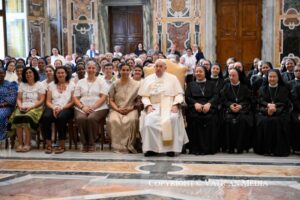
And now to our third point: charity. All four of your foundations were established to support and educate impoverished young people who, without necessary help, would not have been able to receive a suitable education or even respond to their calling. Saint Madeleine Sophie Barat, Saint Justin Maria Russolillo, Venerable Maria Antonia Lalia and Mother Caterina Molinari saw in them a sign from God for their mission. In the same way, you do well, in these days of communal discernment, to keep the faces of the poor ever before you, and, mindful of them, to seek to fan into flame the spirit of gratuitousness and selfless love that marked the beginnings of your presence in the Church. Jesus speaks to us through our brothers and sisters in need (cf. Mt 25:31-45); in every gift we give to them, there is a reflection of God’s love. And let us not forget what will happen at the final Judgement: the Lord will not ask us, “What have you studied? How many degrees did you get? How many works did you undertake…?” No, no. Instead, “Come, come with me”, the Lord will say, “for I was hungry and you gave me food, I was thirsty and you gave me drink; I was persecuted and you cared for me”. That is the subject of the final examination on which we shall be judged. This is the source of light for our journey and the effective antidote for overcoming, in ourselves and all around us, the culture of excess. Please, do not discard people, do not choose people based on worldly criteria, on how important they are or how much money they have… We must reject these worldly criteria! Do not discard, but welcome and embrace everyone, love everyone. We must reject that culture stemming from individualism and social breakdown, which sadly prevails in our time (cf. Message for the XXVII World Day of the Sick, 25 November 2018).
Dear brothers and sisters, thank you for all you do! Persevere in your mission with confidence and, please, do not forget to pray for me, but for and not against! This is very important.
And now the Blessing, and after the Blessing please approach one by one, so I have the joy of greeting you personally.
Related

Pope Francis spent a peaceful night
Exaudi Staff
02 March, 2025
1 min
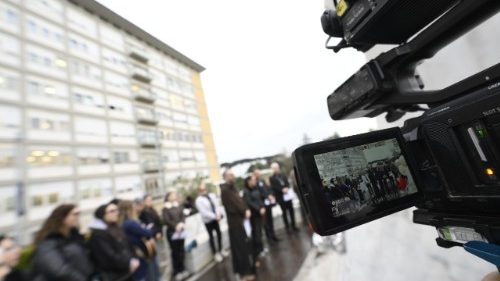
Pope Francis has had a peaceful night
Exaudi Staff
25 February, 2025
1 min

What should the boyfriend or girlfriend I should find be like?
Patricia Jiménez Ramírez
24 February, 2025
4 min
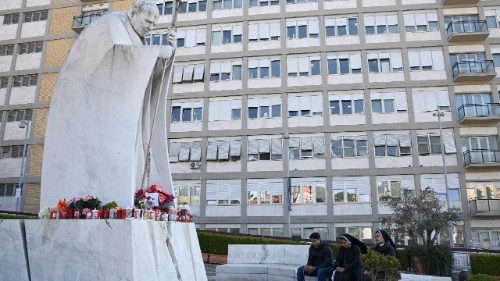
The Pope spent a quiet night at Gemelli
Exaudi Staff
23 February, 2025
1 min
 (EN)
(EN)
 (ES)
(ES)
 (IT)
(IT)

